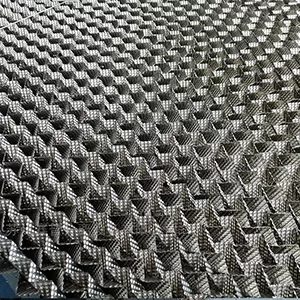Is PP structured packing Fire-Resistant?
PP (polypropylene) structured packing is not inherently fire-resistant, as polypropylene is a thermoplastic polymer with limited resistance to high temperatures and flame exposure. Its fire performance is determined by the intrinsic properties of polypropylene, which is classified as a flammable material under standard fire conditions.

Polypropylene has a relatively low melting point (around 160–170°C) and a high ignition temperature (approximately 420–500°C), but once ignited, it burns readily and can melt, drips of molten plastic may spread the fire. During combustion, it releases flammable gases, which can sustain or intensify the flame. This characteristic makes PP structured packing unsuitable for applications where direct exposure to open flames, high-temperature sparks, or extreme heat sources is likely.
However, modifications can enhance its fire resistance to some extent. Some PP materials are treated with flame retardants during manufacturing to reduce flammability, slow down combustion, or prevent the spread of fire. Flame-retardant PP structured packing may self-extinguish when the ignition source is removed, reducing the risk of fire propagation. Even with such modifications, though, it is not considered fully fire-resistant and should not be used in environments with strict fire safety requirements unless specifically certified for such use.
In industrial applications, the fire risk of PP structured packing must be assessed based on the operating conditions. It is generally suitable for processes with moderate temperatures and no direct flame exposure, such as water treatment or low-temperature chemical separation. In high-temperature processes or areas with fire hazards, alternative materials like metal or ceramic structured packing— which offer better heat resistance and non-flammable properties—are more appropriate.
In summary, unmodified PP structured packing is not fire-resistant and is flammable under certain conditions. While flame-retardant versions provide improved fire performance, they are not completely fireproof. Material selection should align with the fire safety requirements of the specific application to ensure operational safety.

